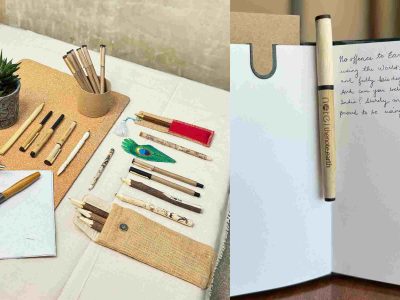bioQ: The impact of stationery on pollution in India is not widely documented as a separate category despite plastic pens and other items contributing to it immensely.
From production, which involves energy-intensive processes and chemical pollution, to their single-use nature leading to significant waste generation, these items pose environmental challenges.
In 2016, Saurabh H Mehta, a 28-year-old, returned to the Capital to join his family business after gaining extensive experience in the off-grid energy sector across various regions of the country.
It was during this period that he fully understood the importance of sustainable solutions.
“Living and working in rural areas on solar energy projects allowed me to witness firsthand the impact of these initiatives,” reflects Mehta, now 36.
Mehta’s family business in stationery dates back to 1964.
“I grew up surrounded by stationery and witnessed changing trends and innovations, mostly from Europe and Japan. However, I was taken aback when I noticed that none of these countries were addressing the environmental impact of stationery,” he says.
This dilemma sparked the creation of bioQ in 2017, a venture dedicated to eco-friendly stationery solutions. Seven years later, Mehta claims to have created the world’s first fully biodegradable pen under a project called The NOTE (No Offense To Earth).
What’s The NOTE pen?
Recycling plastic pens poses significant challenges as mixed materials, small size, and ink contamination make them difficult and costly to process. As a result, many recycling programmes exclude pens, causing most of them to end up in landfills.

“We embarked on a mission to eliminate plastic entirely from pens. After nearly four years of dedicated development, we are proud to introduce a fully biodegradable ballpoint pen. This pen includes a recycled paper refill, non-toxic ink, a choice of metal, paper, or bamboo for the body,” tells Mehta.
On May 24, a patent was granted for a biodegradable refill designed for a biodegradable writing tool.
Mehta explains, “While designing the body and cap from eco-friendly materials was relatively straightforward, the core innovation lay in creating a plastic-free refill. We experimented with various materials for over four years, ultimately developing a recycled paper cylinder with a precise 2mm internal diameter. Our breakthrough came with a vegetable oil-based coating that prevented ink leakage and absorption, achieving an industry-standard 18-month shelf life.”
This solution ensures the refill degrades naturally post-use.
“It took nearly 30 months to secure the patent, with two additional patents currently awaiting approval. The patent provides us with a crucial defensive mechanism, ensuring exclusive production rights that cannot be replicated by others. Previously recipients of innovative stationery from foreign markets, we are now reciprocating by introducing our own innovative designs. Preparations are also underway to launch our products in international markets in the near future,” says Mehta.
A self-funded feat
According to industry reports, the cost of producing a biodegradable pen can be as much as 50% higher than a conventional plastic pen. These factors illustrate the economic challenges and barriers that companies face in transitioning to environmentally-friendly alternatives in the stationary sector.
Mehta stresses, “We are the proud creators of bioQ, a five-year-old brand dedicated to crafting sustainable stationary. Profits from bioQ support our ambitious NOTE project, which received an initial grant from the government. We’ve invested 30-40 lakh ourselves, supplementing the grant funds. While it’s a substantial investment, we’re optimistic that once sales pick up, we’ll successfully compete in the mass market.”
Consumers are opting for eco-friendly stationery that blends style with environmental responsibility, reflecting a rising commitment to sustainability.

Abhishek Shukla, a team member at bioQ, adds, “Currently, our biodegradable pens are priced higher due to the complexity in producing paper refills. We’ve implemented a meticulous process to ensure quality, which has initially led to higher costs as we establish ourselves in the market. This approach allows us to maintain sustainability efforts while we work towards achieving a stronger foothold in the industry. However, our aim is to eventually sell the pens at Rs 10, competing directly with non-biodegradable pens in terms of price.”
Expanding Horizons
Mehta and his team are currently focussing on developing a range of stationery items.
“This year, our primary focus is on ballpoint pens, but we are also developing zero waste gel pens, highlighters, and pencils,” he explains. “In particular, we are working on a fully biodegradable pencil where every component is biodegradable. Our design ensures that the pencil is completely consumed with use.”

Another initiative, the ‘Manmauji’ project, aims to foster artist collaborations across seven locations.
India, with its rich heritage of diverse art forms, faces the challenge of some of these traditions fading from memory. NOTE intends to amplify the visibility of these dwindling art forms through pens.
“We are partnering with artists who will design the exteriors of the pen, integrating these unique art forms,” explains Mehta.
A physical B2B store catering to bulk orders is also in the pipeline.





